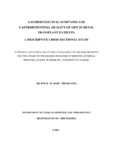| dc.contributor.author | Maru, Rupal .M. | |
| dc.date.accessioned | 2016-11-18T08:26:21Z | |
| dc.date.available | 2016-11-18T08:26:21Z | |
| dc.date.issued | 2016 | |
| dc.identifier.uri | http://hdl.handle.net/11295/97549 | |
| dc.description.abstract | Background
Renal transplant recipients are a special group with specific needs in their care, overall care is centered on the graft function and bodily functioning. The immunosuppressive state and immunosuppression affect them greatly. The immunosuppressive state and immunosuppression affects ones ability to function in this new acquired state of being. Gastrointestinal symptoms impact their quality of life over several Qol domains that can be evaluated to improve patients commonly overlooked areas of patient care.
Objectives
The aim of this study was to establish the gastrointestinal symptoms and their gastrointestinal quality of life by identifying the prevalent symptoms and the quality of life at the time of interview.
Methods
A total of 83 patients were recruited from the renal transplant clinic that runs at the Kenyatta National Hospital renal unit on Tuesdays. This was a cross-sectional study with consecutive sampling. All patients who gave consent were recruited. The data was collected over eight weeks. Patients records were used to collect data on prescribed medication. Demographic data was collected using pre-structured questionnaires. The validated tools used for this study were the Gastrointestinal Symptom Rating Scale (GSRS) and Gastrointestinal Quality of Life(GIQLI).Renal transplant patients with a stable graft were recruited to fill the self -administered GSRS .The GIQLI was filled by the interviewer during the same clinic visit.
Results
Of the 83 patients enrolled during the study period, 57% were males. The mean age was 41.3 years with a median of 52 years.
Using the GSRS score 96% of patients reporting at least one gastrointestinal symptom (defined as a score>1) When considering individual GSRS symptoms across all five domains four symptoms most frequently reported by patients were, in order of prevalence, abdominal pain (57%), boborygmus (55%), heartburn (55%) and regurgitation (53%).
xiv
The mean reported GSRS total score was 3.364. Combining individual symptoms into the five domains of the GSRS scores gave of 3.42 for diarrhea, 4.29 for indigestion, 3.46 for constipation, 3.18 for abdominal pain and 2.29 for reflux syndrome.
For the patients who ever experienced gastrointestinal symptom, the mean reported GIQLI total score was 2.326. Combining individual symptoms into the five domains of the GIQLI scores gave of 1.89 for GI symptoms, 0.83 for emotional function, 1.12 for physical function, 1.65 for social function and 6.14 for medical treatment.
Conclusion
The presence of GSRS score of >1 was reported at 96% most symptoms reported as mild. This has an impact in the HRQol in renal transplant patients. Immunosuppressants may not be singled out to be the only contributor yet the high burden does necessitate considerations when choosing the best suited immunosuppressive therapy. | en_US |
| dc.language.iso | en | en_US |
| dc.publisher | University of Nairobi | en_US |
| dc.rights | Attribution-NonCommercial-NoDerivs 3.0 United States | * |
| dc.rights.uri | http://creativecommons.org/licenses/by-nc-nd/3.0/us/ | * |
| dc.title | Gastrointestinal symptoms and gastrointestinal quality of life in renal transplant patients: a descriptive cross sectional study | en_US |
| dc.type | Thesis | en_US |
| dc.description.department | a
Department of Psychiatry, University of Nairobi, ; bDepartment of Mental Health, School of Medicine,
Moi University, Eldoret, Kenya | |



